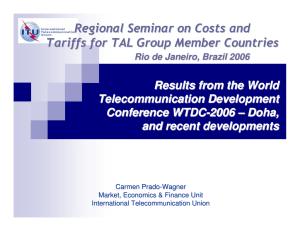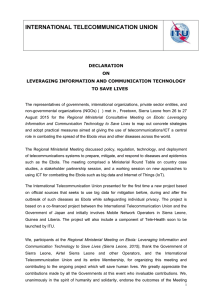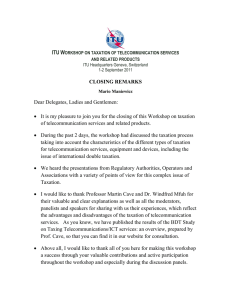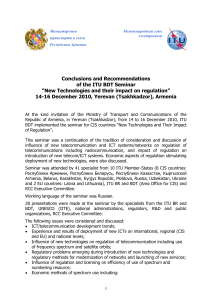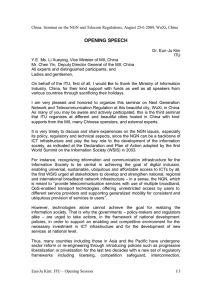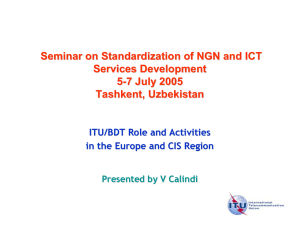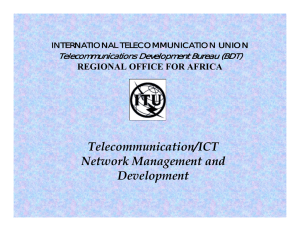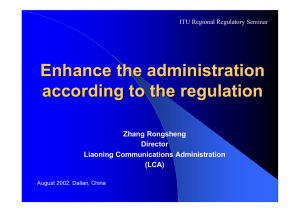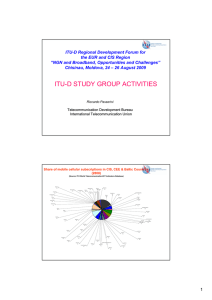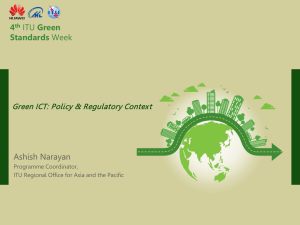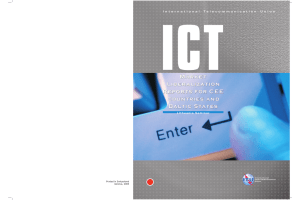Welcoming Speech ITU Regional Seminar on Competition & Regulation August 5-8, 2002
advertisement
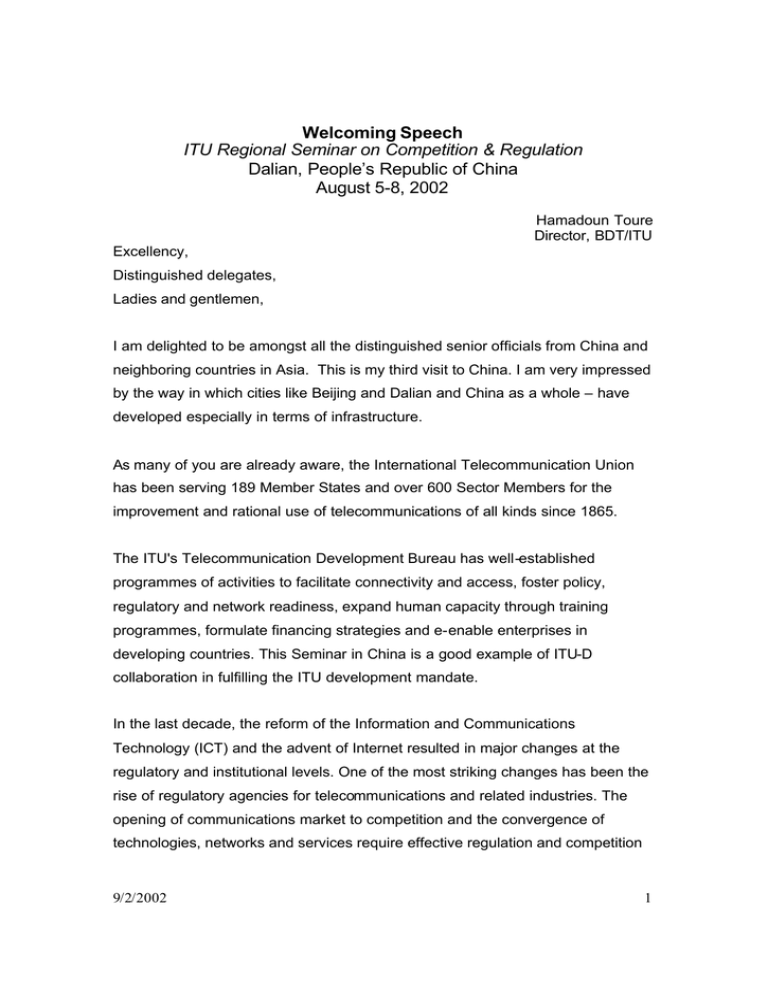
Welcoming Speech ITU Regional Seminar on Competition & Regulation Dalian, People’s Republic of China August 5-8, 2002 Hamadoun Toure Director, BDT/ITU Excellency, Distinguished delegates, Ladies and gentlemen, I am delighted to be amongst all the distinguished senior officials from China and neighboring countries in Asia. This is my third visit to China. I am very impressed by the way in which cities like Beijing and Dalian and China as a whole – have developed especially in terms of infrastructure. As many of you are already aware, the International Telecommunication Union has been serving 189 Member States and over 600 Sector Members for the improvement and rational use of telecommunications of all kinds since 1865. The ITU's Telecommunication Development Bureau has well-established programmes of activities to facilitate connectivity and access, foster policy, regulatory and network readiness, expand human capacity through training programmes, formulate financing strategies and e-enable enterprises in developing countries. This Seminar in China is a good example of ITU-D collaboration in fulfilling the ITU development mandate. In the last decade, the reform of the Information and Communications Technology (ICT) and the advent of Internet resulted in major changes at the regulatory and institutional levels. One of the most striking changes has been the rise of regulatory agencies for telecommunications and related industries. The opening of communications market to competition and the convergence of technologies, networks and services require effective regulation and competition 9/2/2002 1 rules. Effective regulation ensures fair competition, a stable environment to attract investment and ensure universal access to communications services at affordable prices. At the dawn of 21st century, we – the worldwide telecommunity – face numerous challenges ranging from the macro economic difficulties of rapidly fluctuating markets to the sector-specific chronic telecommunication gaps between the haves and have-nots –named ‘digital divide’. Recognizing these challenges, The 3rd World Telecommunication Development Conference, held in Istanbul earlier this year addressed the issue of the Digital Divide at several levels and adopted an action plan to bridge this divide and transform it into digital opportunities. While retaining the continuity of the Valetta Action Plan, the five programmes mark a radical departure from the orientation of the previous plan period. The new World Telecommunication Development Report 2002 described the new telecommunication environment as global, mobile, private and competitive. The main programmatic elements of the Istanbul Action Plan will serve to re-shape the bureau and the sector for these new realities. The new Regulatory Reform programme shadows the maturing of the regulatory environment by focusing on practical tools and resources for an upcoming generation of regulators to help them fulfill their national ICT development goals. Technology and Network Development has been the mainstay of the ITU-D. Following your clear mandate to build the infrastructure for the Information Society, this programme will help developing countries in migrating to new generation technologies, whether it be in mobile, broadcasting, spectrum management, Internet protocol or multimedia. E-Strategies, a newly created programme, is dedicated to electronically delivered applications and services. This programme seeks to assist developing countries to harness the potential of ICTs and new technologies such as Internet protocol, 9/2/2002 2 to advance universal service, contribute to good governance, better access to health services, distance-learning and reducing the social divide. The new programme provides the crucial link between the way we perceive the digital divide and increased use of and confidence in e-services. Finance and Economics programme has readied itself for costing and tariffing in a competitive environment, where the focus has shifted from infrastructure to services and from state-funding to private sector investment. Likewise, Human Resources programme is enlarging its scope from training administrators and engineers to building capacity among policy makers and regulatory authorities, who are at the cutting edge of designing and implementing policies. Special Programme for the LDCs a biennial approach will be used to direct assistance to twelve countries for a period of two years rather than six c ountries per year to allow for a more sustained follow-up of actions taken, including possible evaluation, and a mustering of partnerships through Partnership Round Tables and other means of mobilizing resources Affordability, Accessibility and Awareness were identified at the Special Session on Bridging the Digital Divide as the three overarching factors in bridging the gap between the ICT haves or could-haves and the ICT have-nots or could havenots. Istanbul Action Plan will function as a well- rounded programme to address all these elements with foresight in a future-proof manner. Therefore, I believe, this Seminar is designed to discuss and exchange experiences and practices among participating countries not only for the basic regulatory principles in the WTO Reference Papers but also for the next round of negotiation on basic telecommunications. 9/2/2002 3 Hopefully, the outcome of this Seminar can assist the People’s Republic of China to prepare for its new membership in the WTO and the participating members to achieve the main purpose of ITU – i.e., facilitate and enhance development of ICT at national, regional, and global levels. In the long run, we all can enjoy the benefits in the very fascinating telecommunication sector and the emerging ICTbased information age of the future. Thank you for your kind attention. 9/2/2002 4

